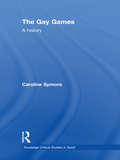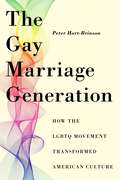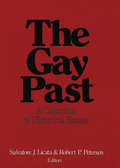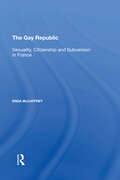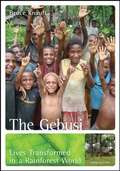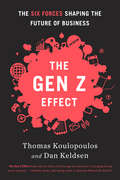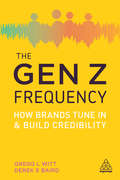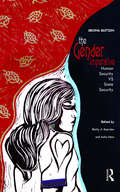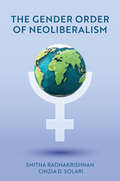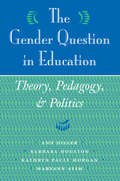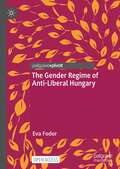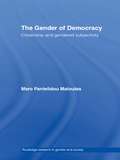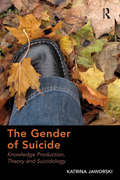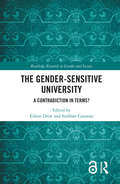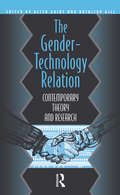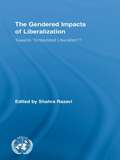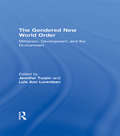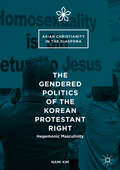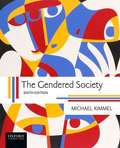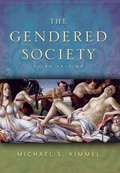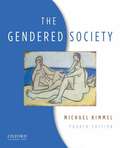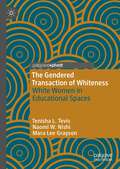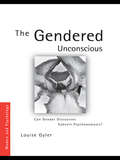- Table View
- List View
The Gates of Janus
by Ian BradyThe Moors Murderer of 1960s Britain analyzes and explores a series of serial killersincluding himself.
The Gay Games: A History (Routledge Critical Studies in Sport)
by Caroline SymonsThe Gay Games is an important piece of new social history, examining one of the largest sporting, cultural and human rights events in the world. Since their inception in 1980, the Gay Games have developed into a multi-million dollar mega-event, engaging people from all continents, while the international Gay Games movement has become one of the largest and most significant international institutions for gay and lesbian people. Drawing on detailed archival research, oral history and participant observation techniques, and informed by critical feminist theory and queer theory, this book offers the first comprehensive history of the Gay Games from 1980 through to the Chicago games of 2006. It explores the significance of the Games in the context of broader currents of gay and lesbian history, and addresses a wide range of key contemporary themes within sports studies, including the cultural politics of sport, the politics of difference and identity, and the rise of sporting mega-events. This book is important reading for any serious student of international sport or gender and sexuality studies.
The Gay Marriage Generation: How the LGBTQ Movement Transformed American Culture
by Peter Hart-BrinsonThe generational and social thinking changes that caused an unprecedented shift toward support for gay marriageHow did gay marriage—something unimaginable two decades ago—come to feel inevitable to even its staunchest opponents? Drawing on over 95 interviews with two generations of Americans, as well as historical analysis and public opinion data, Peter Hart-Brinson argues that a fundamental shift in our understanding of homosexuality sparked the generational change that fueled gay marriage’s unprecedented rise. Hart-Brinson shows that the LGBTQ movement’s evolution and tactical responses to oppression caused Americans to reimagine what it means to be gay and what gay marriage would mean to society at large. While older generations grew up imagining gays and lesbians in terms of their behavior, younger generations came to understand them in terms of their identity. Over time, as the older generation and their ideas slowly passed away, they were replaced by a new generational culture that brought gay marriage to all fifty states.Through revealing interviews, Hart-Brinson explores how different age groups embrace, resist, and create society’s changing ideas about gay marriage. Religion, race, contact with gay people, and the power of love are all topics that weave in and out of these fascinating accounts, sometimes influencing opinions in surprising ways. The book captures a wide range of voices from diverse social backgrounds at a critical moment in the culture wars, right before the turn of the tide. The story of gay marriage’s rapid ascent offers profound insights about how the continuous remaking of the population through birth and death, mixed with our personal, biographical experiences of our shared history and culture, produces a society that is continually in flux and constantly reinventing itself anew.An intimate portrait of social change with national implications, The Gay Marriage Generation is a significant contribution to our understanding of what causes generational change and how gay marriage became the reality in the United States.
The Gay Past: A Collection of Historical Essays
by Salvatore J. Licata Robert P. PetersenFascinating reading on the plight of gay men and women through the ages. The contributors to this compassionate book document how society has made life difficult and even dangerous for homosexual people. Through narrative history as well as biography, these essays trace the legal, social, and physical consequences of this oppression.
The Gay Republic: Sexuality, Citizenship and Subversion in France
by Enda McCaffreyThe French Republic does not discriminate or differentiate between individuals in terms of gender, difference or ethnicity. However recent legislation has enshrined the rights of gays and lesbians and it is this legislation that has inspired the author to examine the unique relationship between the Republic and its citizens - in this case gay and lesbian citizens. The author assesses the impact the new legislation has had on France as a democratic, multicultural republic founded on equality of citizenship, and on the lesbian and gay community, caught between inclusion and exclusion. The book combines approaches from sociology, political science, legal studies, cultural studies and the study of gender and sexuality, and will appeal to academics and postgraduates in these fields.
The Gebusi: Lives Transformed In A Rainforest World
by Bruce KnauftWritten specifically for students, this ethnography provides an engaging, real-life account of the transition from a traditional to a modern culture. <P><P> It uses vibrant, poignant stories and examples to connect developments among Gebusi to topics widely discussed in anthropology courses, including comparative aspect of subsistence, kinship, politics, religion, gender, ethnicity, nationalism, and applied anthropology. When first studied by Bruce Knauft, the Gebusi of Papua New Guinea conducted ritual dances and spirit séances, practiced alternative sexual customs, and endured a high rate of violence. <P> By the late 1990s, Gebusi had converted to Christianity and actively pursued market activity, schooling, government programs, sports leagues, and disco music. By 2008, however, their public services and cash economy had deteriorated, and Gebusi relied increasingly, once again, on indigenous customs and practices. Some aspects of change, however, remained enduring. More recently, problems of economic hardship have persisted--as has the resilience of Gebusi culture. This third edition of the The Gebusi has been updated and streamlined throughout and has new material as well as "Broader Connections" sections following each chapter.
The Geek's Chihuahua: Living with Apple (Forerunners: Ideas First)
by Ian BogostAt dinnertime: check. At a traffic light: check. In bed at the end of the day: check. In line at the coffee shop: check. In The Geek&’s Chihuahua, Ian Bogost addresses the modern love affair of &“living with Apple&” during the height of the company&’s market influence and technology dominance. The ubiquitous iPhone and its kin saturate our lives, changing everything from our communication to our posture. Bogost contrasts the values of Apple&’s massive success in the twenty-first century with those of its rise in the twentieth. And he connects living with Apple with the phenomenon of &“hyperemployment&”—the constant overwork of today&’s technological life that all of us now experience. Bogost also reflects on the new potential function—as well as anxiety and anguish—of devices like the Apple Watch. We are tethered to our devices, and, as Bogost says: that&’s just life—anxious, overworked, and utterly networked life. Forerunners: Ideas First is a thought-in-process series of breakthrough digital publications. Written between fresh ideas and finished books, Forerunners draws on scholarly work initiated in notable blogs, social media, conference plenaries, journal articles, and the synergy of academic exchange. This is gray literature publishing: where intense thinking, change, and speculation take place in scholarship.
The Gen Z Effect: The Six Forces Shaping the Future of Business
by Dan Keldsen Tom KoulopoulosOne of the most profound changes in business and society is the emergence of the post-Millennial generation, Gen Z. While every new generation has faced its share of disruption in technology, economics, politics and society, no other generation in the history of mankind has had the ability to connect every human being on the planet to each other and in the process to provide the opportunity for each person to be fully educated, and socially and economically engaged. What might this mean for business, markets, and educational institutions in the future? In this revolutionary new book, The Gen Z Effect: The Six Forces Shaping the Future of Business, authors Tom Koulopoulos and Dan Keldsen delve into a vision of the future where disruptive invention and reinvention is the acknowledged norm, touching almost every aspect of how we work, live and play. From radical new approaches to marketing and manufacturing to the potential obliteration of intellectual property and the shift to mass innovation, to the decimation of our oldest learning institutions through open source and adaptive learning, The Gen Z Effect provides a mind-bending view of why we will need to embrace Gen Z as the last, best hope for taking on the world's biggest challenges and opportunities, and how you can prepare yourself and your business for the greatest era of disruption, prosperity, and progress the world has ever experienced.
The Gen Z Frequency: How Brands Tune In and Build Credibility
by Gregg L. Witt Derek E. BairdGeneration Z, ranging from tweens to young adults, has enormous spending power; yet it is one of the most challenging generational cohorts for brands to reach. It is projected to be the largest consumer demographic in history, driving a forecast from the HRC Retail Advisory of 40% of all US consumer spending, and another 40% of all consumers in the US, Europe and BRIC by 2020 (Brazil, Russia, India, China), according to other sources. Embodying an unrelenting relationship with information and mobile technology from a young age, Generation Z's ecosystem is infinitely more complex and varied than any generation before. Staying tuned-in to this demographic's impatience, confidence and constantly evolving trends can be daunting for any marketer trying to keep up.The Gen Z Frequency offers a comprehensive guide for any brand or organization trying to reach this demographic, covering fundamental truths, content creation, engagement strategies and tactics such as social media, experiential, emerging technologies, and much more. It is woven with fascinating case studies and real-world stories from the trenches, plus key insights from leading youth brands and Gen Z themselves. Whether you are new to marketing or a seasoned expert, The Gen Z Frequency is the ultimate resource for tuning in to Generation Z.
The Gender Imperative: Human Security vs State Security
by Betty A. Reardon Asha HansThis collection of essays by feminist scholar-activists addresses the crucial problem of human security in a world of heavily armed, militarized states. It describes the gendered aspects of human security excluded from the realist militarism that dominates current security policy in most nation states. The book deepens and broadens current security discourses, encouraging serious consideration of alternatives to the present global security system that functions to advantage state security over human security, a system the contributors perceive to be rooted in the patriarchal nature of the nation state. This second edition will be of interest to academics and students of gender studies, women’s studies, international studies, development studies, human rights, security studies, peace studies and peace education.
The Gender Order of Neoliberalism
by Smitha Radhakrishnan Cinzia D. SolariWhat do mompreneurs, angry working-class men, and migrant domestic workers all have in common? They are all gendered subjects responding to the economic, political, and cultural realities of neoliberalism’s global gender order. In this ambitious book, Radhakrishnan and Solari map the varied gendered pathways of a global hegemonic regime. Focusing on the US, the former Soviet Union, and South and Southeast Asia, they argue that the interconnected histories of imperialism, socialism, and postcolonialism have converged in a new way since the fall of the Soviet Union, transforming the post-war international order that preceded it. Today, the ideal of the empowered woman – a striving, entrepreneurial subject who overcomes adversity and has many “choices” – symbolizes modernity for diverse countries competing for status in the global hierarchy. This ideal bridges the painful gap between aspiration and lived reality, but also spurs widespread discontent. Blending social theory, rich empirical evidence, and a multi-sited understanding of neoliberalism, this book invites all of us to question taken-for-granted knowledge about gender and capitalism, and to look to grassroots international movements of the past to chart the path to a fairer future.
The Gender Question in Education: Theory, Pedagogy, and Politics
by Ann Diller<p>In this innovative book, four prominent philosophers of education introduce readers to the central debates about the role of gender in educational practice, policymaking, and theory. More a record of a continuing conversation than a statement of a fixed point of view, The Gender Question in Education enables students and practicing teachers to think through to their own conclusions and to add their own voices to the conversation. <p>Throughout, the authors emphasize the value of a gender-sensitive perspective on educational issues and the relevance of an ethics of care for educational practice. Among the topics discussed are feminist pedagogy, gender freedom in public education, androgyny, sex education, multiculturalism, the inclusive curriculum, and the educational significance of an ethics of care. <p>The multiauthor, dialogic structure of this book provides unusual breadth and cohesiveness as well as a forum for the exchange of ideas, making it both an ideal introduction to gender analysis in education and a model for more advanced students of gender issues.
The Gender Regime of Anti-Liberal Hungary
by Eva FodorThis Open Access book explains a new type of political order that emerged in Hungary in 2010: a form of authoritarian capitalism with an anti-liberal political and social agenda. Eva Fodor analyzes an important part of this agenda that directly targets gender relations through a set of policies, political practice and discourse—what she calls “carefare.” The book reveals how this is the anti-liberal response to the crisis-of-care problem and establishes how a state carefare regime disciplines women into doing an increasing amount of paid and unpaid work without fair remuneration. Fodor analyzes elements of this regime in depth and contrasts it to other social policy ideal-types, demonstrating how carefare is not only a set of policies targeting women, but an integral element of anti-liberal rule that can be seen emerging globally.
The Gender of Democracy: Citizenship and Gendered Subjectivity (Routledge Research in Gender and Society #Vol. 12)
by Maro Pantelidou MaloutasAs developments in the European Union and elsewhere make the re-examination of citizenship a pressing issue, this book reflects on the persisting "masculine" character of contemporary democracy and the measures taken in the EU to combat it. Combining a theoretical approach with a specific critique of EU gender policy, The Gender of Democracy argues that substantial democracy as a social project cannot co-exist with the existing system of gender relations ,which are inherently dichotomous and thus demarcate social categories of superior and inferior status. Drawing on utopian thought, Maro Pantelidou Maloutas proposes a re-examination of the notion of the gendered subject and a revision of the dominant perceptions of the relations between sex, sexuality and gender. The book contains a critique of specific EU gender policies and shows how in seeking to do away with gender inequality, simply formulating policies that are pro-women is not enough. In order to approach democracy’s emancipatory component, far-reaching policies which deconstruct rather than modernize gender relations are needed.
The Gender of Suicide: Knowledge Production, Theory and Suicidology
by Katrina JaworskiDrawing on diverse theoretical and textual sources, The Gender of Suicide presents a critical study of the ways in which contemporary society understands suicide, exploring suicide across a range of key expert bodies of knowledge. With attention to Durkheim's founding study of suicide, as well as discourses within sociology, law, medicine, psy-knowledge and newsprint media, this book demonstrates that suicide cannot be understood without understanding how gender shapes it, and without giving explicit attention to the manner in which prevailing claims privilege some interpretations and experiences of suicide above others. Revealing the masculine and masculinist terms in which our current knowledge of suicide is constructed, The Gender of Suicide, explores the relationship between our grasp of suicide and problematic ideas connected to the body, agency, violence, race and sexuality. As such, it will appeal to sociologists and social theorists, as well as scholars of cultural studies, philosophy, law and psychology.
The Gender-Sensitive University: A Contradiction in Terms? (Routledge Research in Gender and Society)
by Eileen Drew Siobhán CanavanThe Gender-Sensitive University explores the prevailing forces that pose obstacles to driving a gender-sensitive university, which include the emergence of far-right movements that seek to subvert advances towards gender equality and managerialism that promotes creeping corporatism. This book demonstrates that awareness of gender equality and gender sensitivity are essential for pulling contemporary academia back from the brink. New forms of leadership are fundamental to reforming our institutions. The concept of a gender-sensitive university requires re-envisioning academia to meet these challenges, as does a different engagement of men and a shift towards fluidity in how gender is formulated and performed. Academia can only be truly gender sensitive if, learning from the past, it can avoid repeating the same mistakes and addressing existing and new biases. The book chapters analyse these challenges and advocate the possibilities to ‘fix it forward’ in all areas. Representing ten EU countries and multiple disciplines, contributors to this volume highlight the evidence of persistent gender inequalities in academia, while advocating a blueprint for addressing them. The book will be of interest to a global readership of students, academics, researchers, practitioners, academic and political leaders and policymakers who share an interest in what it takes to establish gender-sensitive universities.
The Gender-Technology Relation: Contemporary Theory And Research: An Introduction (Gender And Society Ser.)
by Keith Grint Rosalind GillProvides a review of contemporary theory and empirical research into the relationship between feminism and social constructivism. Through case studies, the book focuses on issues raised by different technologies and on developing theoretical understandings of the gender-technology relation.
The Gendered Impacts of Liberalization: Towards "Embedded Liberalism"? (Routledge/UNRISD Research in Gender and Development)
by Shahra RazaviIn the last two decades public policies have reflected a drive for accelerated global economic integration ("globalization"), associated with greater economic liberalization. The outcomes have been largely disappointing, even in the estimate of their designers. Rural livelihoods have become more insecure, and the expected growth has rarely materialized. Insecurity is also etched into the growth of informal economies across the world. Yet the economic policy agenda that has been so adverse to many people around the world has also provided new opportunities to some social groups, including some low-income women. In response to widespread discontent with the liberalization agenda, more attention is now being given to social policies and governance issues, viewed as necessary if globalization is to be "tamed" and "embedded". The contributors to this volume address key issues and questions such as whether states have the capacity to remedy the social distress unleashed by liberalization in the absence of any major revision of their macroeconomic policies and whether the proposed social policy reforms can redress gender-based inequalities in access to resources and power.
The Gendered New World Order: Militarism, Development, and the Environment
by Lois Ann Lorentzen Jennifer TurpinEcological security seems increasingly precarious and battles over land and models of economic development now lead to military conflicts. The Gendered New World Order addresses the compelling issue of how gender connects the global problems of militarism, underdevelopment, and environmental decay. Scholars from around the world make connections between seemingly disparate issues such as refugees, polluted waters, bombed vilages, massive dam projects, starving children, deforestation, nuclear arms buildup and the rights of women.
The Gendered Politics of the Korean Protestant Right
by Nami KimThis book provides a critical feminist analysis of the Korean Protestant Right's gendered politics. Specifically, the volume explores the Protestant Right's responses and reactions to the presumed weakening of hegemonic masculinity in Korea's post-hypermasculine developmentalism context. Nami Kim examines three phenomena: Father School (an evangelical men's manhood and fatherhood restoration movement), the anti-LGBT movement, and Islamophobia/anti-Muslim racism. Although these three phenomena may look unrelated, Kim asserts that they represent the Protestant Right's distinct yet interrelated ways of engaging the contested hegemonic masculinity in Korean society. The contestation over hegemonic masculinity is a common thread that runs through and connects these three phenomena. The ways in which the Protestant Right has engaged the contested hegemonic masculinity have been in relation to "others," such as women, sexual minorities, gender nonconforming people, and racial, ethnic, and religious minorities.
The Gendered Society
by Michael KimmelThe sixth edition of The Gendered Society explores current thinking about gender, both inside academia and in our everyday lives. Michael Kimmel challenges the claim that gender is limited to women's experiences--his compelling and balanced study of gender includes both masculine and feminine perspectives. Kimmel makes three bold and persuasive statements about gender. First, he demonstrates that gender differences are often extremely exaggerated; in fact, he argues that men and women have much more in common than we think they do. Kimmel also challenges the pop psychologists who suggest that gender difference is the cause of inequality between the sexes; instead, he reveals that the reverse is true-gender inequality itself is the cause of the differences between men and women. Finally, he illustrates that gender is not merely an element of individual identity, but a socially constructed institutional phenomenon.
The Gendered Society (3rd edition)
by Michael S. KimmelThoroughly updated and revised, the third edition of The Gendered Society explores current thinking about gender, both inside academia and in our everyday lives.
The Gendered Society (4th edition)
by Michael S. KimmelThoroughly updated throughout, the fourth edition of The Gendered Society explores current thinking about gender, both inside academia and in our everyday lives. Michael Kimmel challenges the claim that gender is limited to women's experiences-his compelling and balanced study of gender includes both masculine and feminine perspectives. Kimmel makes three bold and persuasive statements about gender. First, he demonstrates that gender differences are often extremely exaggerated; in fact, he argues that men and women have much more in common than we think they do. Kimmel also challenges the pop psychologists who suggest that gender difference is the cause of inequality between the sexes; instead, he reveals that the reverse is true-gender inequality itself is the cause of the differences between men and women. Finally, he illustrates that gender is not merely an element of individual identity, but a socially constructed institutional phenomenon. Essential reading for both students and scholars, The Gendered Society is an authoritative, incisive, and lively statement about contemporary gender relations from one of the country's foremost thinkers on the subject.
The Gendered Transaction of Whiteness: White Women in Educational Spaces
by Tenisha L. Tevis Naomi W. Nishi Mara Lee GraysonThis book considers the causes and effects of an education field that remains white and gendered and critically examines how the race-gendered power afforded to white women in educational spaces is transacted through instructional practices and interpersonal interactions. White women occupy a complex position in society within systems of white supremacy and patriarchy, participating as both oppressors and oppressed. Emphasizing the consequences of whiteness for educational professionals and students of all racial identities, the chapters in this book offer strategies for identifying and moving beyond the gendered transaction of whiteness, including what white women can do instead and how all educators can work toward transformative antiracist education.
The Gendered Unconscious: Can Gender Discourses Subvert Psychoanalysis? (Women and Psychology)
by Louise GylerFeminist interventions in psychoanalysis have often attempted either to subvert or re-frame the masculinist and phallocentric biases of Freud's psychoanalysis. This book investigates the nature of these interventions by comparing the status and treatment of women in two different psychoanalytic models: the Kleinian and the feminist models. It argues that, in fact, these interventions have historically tended to reinforce such biases by collapsing the distinction between the gendered minds of individuals and theories of gender. This investigation is framed by two steps. First, in assessing the position of women and the feminine in psychoanalysis, The Gendered Unconscious explores not only the ways they are represented in theory, but also how these representations function in practice. Secondly, this book uses a framework of a comparative dialogue to highlight the assumptions and values that underpin the theory and clinical practice in the two psychoanalytic models. This comparative critique concludes with the counter-intuitive claim that contemporary Kleinian theory may, in practice, hold more radical possibilities for the interests of women than the practices derived from contemporary psychoanalytic gender theory. This book is of significant interest to those studying the psychology of women, psychoanalytic studies, health psychology, sociology, gender studies and cultural studies. It will also be of interest to clinicians and candidates of professional psychotherapy and psychoanalytic training programmes.

